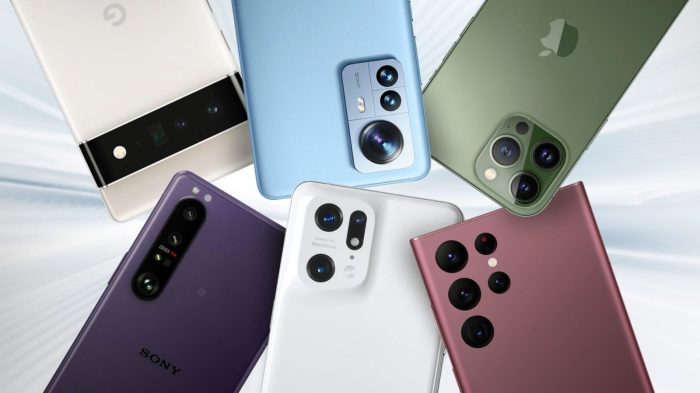Smartphone J: A Comprehensive Exploration delves into the captivating world of mobile technology, tracing its evolution from humble beginnings to the sophisticated devices we know today. This journey unveils the intricate workings of smartphone hardware, explores the diverse landscape of operating systems, and examines the profound impact these devices have had on our lives.
From the revolutionary touchscreens of the early 2000s to the cutting-edge artificial intelligence of modern smartphones, this exploration dissects the technological advancements that have propelled mobile technology forward. We’ll delve into the inner workings of smartphones, understanding the components that power their functionality and the innovations that drive their performance. This exploration examines the various operating systems that govern the smartphone experience, their strengths and weaknesses, and their impact on user interaction and app ecosystems.
Smartphone Operating Systems
Smartphone operating systems are the software that powers the functionality and user experience of our mobile devices. They provide the foundation for everything we do on our phones, from making calls and sending messages to accessing apps and browsing the internet. There are several major players in the smartphone operating system market, each with its own strengths and weaknesses.
Android
Android is the most popular smartphone operating system globally, developed by Google. It is an open-source platform, meaning that manufacturers can customize it to suit their specific needs. Android’s open-source nature has led to a wide range of devices at various price points, making it accessible to a broad audience.
Android’s strengths include its flexibility, customization options, and large app ecosystem. Users can personalize their devices with widgets, themes, and launchers. The Google Play Store offers a vast selection of apps, including free and paid options, catering to diverse user needs and interests.
Android also boasts a strong community of developers who contribute to the platform’s growth and innovation. This active community ensures that Android receives frequent updates and security patches, keeping devices secure and up-to-date.
However, Android also faces some challenges. Its fragmentation, with different versions and manufacturers’ customizations, can lead to compatibility issues and security risks. Moreover, some users find Android’s interface less polished and intuitive compared to other operating systems.
iOS
iOS is the operating system developed by Apple for its iPhone and iPad devices. It is known for its user-friendly interface, seamless integration with Apple’s ecosystem, and focus on privacy and security.
iOS’s strengths lie in its simplicity, elegance, and tight integration with other Apple devices. The operating system is designed to be intuitive and easy to use, even for first-time smartphone users. iOS’s focus on privacy and security ensures that user data is protected and that the device is safe from malicious threats.
Apple’s App Store, while smaller than Google Play, boasts a curated selection of high-quality apps. Apple’s strict app review process ensures that apps meet specific quality standards, providing users with a reliable and secure app ecosystem.
Despite its strengths, iOS also has its limitations. Its closed-source nature restricts customization options, and devices are typically more expensive than comparable Android devices. The lack of flexibility can be a drawback for users who prefer to personalize their devices extensively.
Windows Phone
Windows Phone, developed by Microsoft, was once a major player in the smartphone operating system market. However, it has lost significant market share in recent years, with its successor, Windows 10 Mobile, facing limited adoption.
Windows Phone’s strengths included its unique Live Tiles interface, which provided dynamic updates and information at a glance. The operating system also offered a smooth and responsive user experience. However, Windows Phone’s app ecosystem lagged behind Android and iOS, leading to limited app availability and user engagement.
Windows Phone’s failure to gain significant market share can be attributed to several factors, including its limited app availability, lack of developer support, and the dominance of Android and iOS.
Smartphone Security and Privacy: Smartphone J
Smartphones have become indispensable tools for communication, entertainment, and productivity, but their widespread adoption has also brought new security and privacy challenges. The convenience and connectivity that smartphones offer can make them vulnerable to various threats, requiring users to take proactive measures to protect their data and privacy.
Smartphone Security Threats and Vulnerabilities, Smartphone j
Smartphones are susceptible to a wide range of security threats, including malware, phishing attacks, and data breaches.
- Malware: Malicious software can be downloaded unknowingly from untrusted sources, potentially stealing personal information, accessing sensitive data, or disrupting device functionality.
- Phishing Attacks: Users can be tricked into revealing sensitive information through fake websites or emails that mimic legitimate sources, leading to identity theft or financial losses.
- Data Breaches: Security vulnerabilities in apps or operating systems can expose personal data to unauthorized access, compromising privacy and potentially leading to identity theft or financial fraud.
- Physical Theft: Smartphones are easily lost or stolen, and unauthorized access to a lost device can expose sensitive data and compromise privacy.
- Unsecured Wi-Fi Networks: Connecting to public or unsecured Wi-Fi networks can expose data to eavesdropping or interception, making it vulnerable to cyberattacks.
Final Wrap-Up
The world of smartphones is constantly evolving, driven by technological advancements, shifting consumer preferences, and the ever-present quest for innovation. As we move forward, the future of smartphones promises exciting possibilities, from enhanced artificial intelligence and augmented reality to foldable displays and personalized experiences. This exploration provides a comprehensive understanding of the past, present, and future of smartphones, highlighting their profound impact on society and culture, while shedding light on the ethical considerations that accompany their widespread use.
Smartphone J is a popular choice for many users, thanks to its sleek design and impressive performance. If you’re curious about its features, you can show me a smartphone similar to it and see for yourself. The smartphone J offers a user-friendly interface and a long battery life, making it a great option for those who are always on the go.
 Informatif Berita Informatif Terbaru
Informatif Berita Informatif Terbaru
